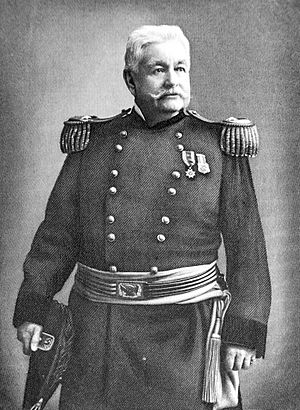Zenas Bliss facts for kids
Quick facts for kids
Zenas R. Bliss
|
|
|---|---|

Major General Zenas R. Bliss
|
|
| Born | April 17, 1835 Johnston, Rhode Island, US |
| Died | January 2, 1900 (aged 64) Washington, D.C., US |
| Place of burial | |
| Allegiance | United States Union |
| Service/ |
United States Army Union Army |
| Years of service | 1854–1897 |
| Rank | |
| Commands held | 1st Brigade, 2nd Division, IX Corps 24th U.S. Infantry Department of Texas |
| Battles/wars | American Civil War Indian Wars |
| Awards | Medal of Honor |
| Other work | author |
Zenas Randall Bliss (born April 17, 1835 – died January 2, 1900) was an important officer and general in the United States Army. He also received the Medal of Honor, which is a very special award for bravery.
General Bliss helped create the first group of Seminole-Negro Indian Scouts. He also wrote detailed memories about his life on the Texas frontier. His son, Zenas Work Bliss, later became the Lieutenant Governor of Rhode Island.
Zenas Bliss grew up in Rhode Island. He graduated from West Point, a famous military school, in 1854. He spent most of his 37-year career serving in Texas. During the American Civil War, he fought for the Union Army. He was even captured and held as a prisoner of war by Confederate forces. Bliss earned his Medal of Honor for his brave actions during the Battle of Fredericksburg.
Contents
Zenas R. Bliss: A Brave American General
Zenas Bliss was born on April 17, 1835, in Johnston, Rhode Island. His family was well-off. When he was just 15 years old, in July 1850, he was accepted into the United States Military Academy. This school is located in West Point, New York.
Early Life and Training
Bliss finished his studies at West Point in 1854. For the next six years, he served in Texas. His first job was as a second lieutenant at Fort Duncan. He also worked at other forts like Fort Davis and Fort Quitman.
He was promoted to first lieutenant in 1860. When the Civil War started, he quickly became a captain in May 1861.
Fighting in the Civil War
The American Civil War began on April 12, 1861. Zenas Bliss was immediately involved in the fighting. He was captured by Confederate soldiers and spent 11 months as a prisoner of war. He was held first in San Antonio, Texas, and then in Richmond, Virginia.
In April 1862, he was finally set free in a prisoner exchange. He then became a Colonel of the 10th Rhode Island Infantry. This group served for 90 days, helping to defend Washington, D.C. After that, Bliss took command of the 7th Rhode Island Infantry in August 1862.
In October 1862, his regiment joined the Ninth Corps of the Army of the Potomac. They fought in the Battle of Fredericksburg in December 1862. It was during this battle that Bliss showed the bravery that would earn him the Medal of Honor years later.
Later, the Ninth Corps moved west. They took part in the Siege of Vicksburg. Bliss's regiment also served under Major General William T. Sherman in the capture of Jackson, Mississippi.
In April 1864, the Seventh Rhode Island rejoined the Army of the Potomac. Bliss became the commander of a brigade, which is a large group of soldiers. His brigade fought in the Battle of the Wilderness. Bliss was hurt by a horse at Spotsylvania. But he returned to lead his brigade in the Siege of Petersburg and the Battle of the Crater.
During the Civil War, Bliss received honorary promotions for his bravery. He was made a major for his service at Fredericksburg. He was also made a lieutenant colonel for his actions at the Battle of the Wilderness. He left volunteer service in June 1865 and went back to his regular army rank of captain.
A Hero's Medal
On December 3, 1898, Zenas Bliss was awarded the Medal of Honor. This was for his great courage during the Battle of Fredericksburg.
After the War
After the Civil War, Bliss stayed in the Regular Army. He continued to be promoted. He became a major in 1867, a lieutenant colonel in 1879, and a colonel in 1886. As a colonel, he commanded the 24th Infantry, a unit with black soldiers and white officers.
Bliss became a brigadier general in 1895 and a major general in 1897. He retired from the Army just eight days later, on May 22, 1897. Including his time at West Point, Bliss served for over 46 years!
Zenas Bliss passed away in Washington, D.C. on January 2, 1900, at 64 years old. He is buried with his wife at Arlington National Cemetery in Arlington, Virginia.
Bliss and his wife had four children, but only two lived to be adults. One of his sons, Zenas Work Bliss, served as the lieutenant governor of Rhode Island from 1910 to 1913.
There is a life-sized painting of General Bliss at the Benefit Street Arsenal in Providence, Rhode Island.
See also
 | Calvin Brent |
 | Walter T. Bailey |
 | Martha Cassell Thompson |
 | Alberta Jeannette Cassell |

